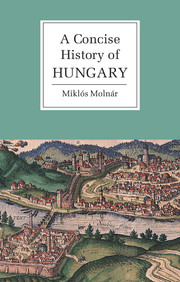Book contents
- Frontmatter
- Contents
- List of illustrations
- Acknowledgements
- Chronology
- 1 FROM THE BEGINNINGS UNTIL 1301
- 2 GRANDEUR AND DECLINE: FROM THE ANGEVIN KINGS TO THE BATTLE OF MOHÁCS, 1301–1526
- 3 A COUNTRY UNDER THREE CROWNS, 1526–1711
- 4 VIENNA AND HUNGARY: ABSOLUTISM, REFORMS, REVOLUTION, 1711–1848/9
- 5 RUPTURE, COMPROMISE AND THE DUAL MONARCHY, 1849–1919
- 6 BETWEEN THE WARS
- 7 UNDER SOVIET DOMINATION, 1945–1990
- 8 1990, A NEW DEPARTURE
- Bibliographical notes
- Index
7 - UNDER SOVIET DOMINATION, 1945–1990
Published online by Cambridge University Press: 05 June 2014
- Frontmatter
- Contents
- List of illustrations
- Acknowledgements
- Chronology
- 1 FROM THE BEGINNINGS UNTIL 1301
- 2 GRANDEUR AND DECLINE: FROM THE ANGEVIN KINGS TO THE BATTLE OF MOHÁCS, 1301–1526
- 3 A COUNTRY UNDER THREE CROWNS, 1526–1711
- 4 VIENNA AND HUNGARY: ABSOLUTISM, REFORMS, REVOLUTION, 1711–1848/9
- 5 RUPTURE, COMPROMISE AND THE DUAL MONARCHY, 1849–1919
- 6 BETWEEN THE WARS
- 7 UNDER SOVIET DOMINATION, 1945–1990
- 8 1990, A NEW DEPARTURE
- Bibliographical notes
- Index
Summary
German occupation was over; Hungary now fell under Stalin's ‘jurisdiction’. Contrary to a widely held belief, it was not the Yalta Conference in February 1945 which determined its fate, but the convergence of several previously existing factors. Among these were the bargaining between Churchill and Stalin in October 1944 in Moscow over zones of influence; President Roosevelt's ‘informal’ consent; and last but foremost, the belligerents' respective positions in the theatre of war.
The Italian armistice in September 1943 created the precedent (see works by Bruno Arcidiacono) for what Stalin would later explain to Djilas: whosoever occupies a territory, imposes its system. Put another way, according to the literary parable of a high-ranking British civil servant, Stalin could emulate Mr Jorrocks (a character from a nineteenth-century novel): ‘Wherever I eat, I lay my head.’ The Anglo-Saxons took over the Peninsula and later Japan; the Soviets would claim countries their army had occupied (vanquished enemy countries): Finland, Romania, Bulgaria, Hungary, East Germany and their zones in Austria, at Vienna, and Berlin. Stalin would additionally secure friends and allies, Czechoslovakia and Poland.
As for Hungary, the Allied Control Commission had to act according to the principle of division: its president, Marshal Kliment Voroshilov exercised the authority of occupation; the three other members took back seats. They protested on several occasions against violations of the armistice provisions, but in vain. Administratively, a national democratic government took over, under Allied control, which had to last until a peace treaty would restore full sovereignty.
- Type
- Chapter
- Information
- A Concise History of Hungary , pp. 295 - 337Publisher: Cambridge University PressPrint publication year: 2001

